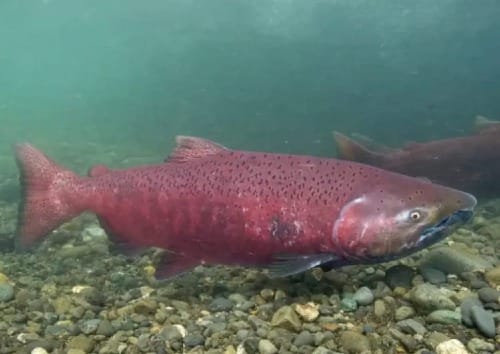Interesting stuff: a Girdwood lodge proposal, a Dunleavy trip to Germany and seafood news
Alaska's governor and Kim Kardashian in the same place? A new tourism lodge in housing-starved Girdwood? Read on for more.
Northern Journal is a newsletter written by me, Anchorage journalist Nat Herz. It’s free to subscribe, and stories are also free to Alaska news outlets to republish through a partnership with the Alaska Beacon.
My goal is reaching the broadest possible audience of Alaskans. But if you can afford it, please consider supporting my work with a $100 annual or $10 monthly voluntary paid membership — these are currently my only sources of revenue for this project. Your support allows me to stay independent and untethered to the demands of the day-to-day news cycle. If you’ve already subscribed, thank you.
It’s time for some news donuts — which, if you didn’t read last week’s newsletter, is my analogy for the high-calorie pieces of information that I’m squeezing into a new, recurring Northern Journal feature I’ve titled “Interesting Stuff.”
This week, I’ve got items on a new Girdwood tourism venture led by some familiar names, a major Anchorage-area trail project, renewable energy feuding and some seafood business and gubernatorial news. Questions or tips about any of this stuff? Drop me a line: natherz@gmail.com or 907-793-0312. Here are the goods:
Dunleavy lands speaking gig in Berlin
Alaska GOP Gov. Mike Dunleavy is scheduled to deliver a keynote address in Berlin next month at “SuperReturn International,” an investor conference at the InterContinental Hotel. Also on the agenda: Kim Kardashian and billionaire private equity investor David Rubenstein. Dunleavy’s address is “Demystifying Alaska: Why global investors should pay attention to Alaska.”
Treadwells push new Girdwood lodge proposal
Businessman and former Alaska Lt. Gov. Mead Treadwell is one of the people behind a major new proposed tourism development at Girdwood’s small, state-owned airport, but the lead spokesman for the project is another Treadwell: Mead’s son Tim.
The Treadwells are also working with Jon Faulkner, who owns the Land’s End resort on the Homer Spit. But it’s Jon’s son Andrew who’s working most closely with Tim.
Their proposed Glacier Valley Lodge has applied to use 11 acres of airport land that’s available for leasing in the otherwise crowded community of Girdwood; the Alaska Department of Transportation is proposing to rent the property for $49,000 a year. The project would include two buildings with up to 150 short-term lodging units, plane storage, a winter-summer sports center, a fly out base, meeting space and food and beverage service, along with 10 600-square-foot employee residences, according to a public notice from the department. (The lodge’s application itself, the department told me, won’t be released until the public notice period is over, and, if competing applications are received, until the award of the lease.)
The developers describe the project as an "itinerant hangar and fly-in/fly-out lodge," and say the proposed scope and design are still being explored. Their one-pager seems to recognize the sensitivity of development in Girdwood, where lodging is tight and where a high-profile housing project was just rejected by the Anchorage Assembly in the face of intense community opposition.
The developers held a public meeting Monday with Girdwood community members and local elected officials. Concerns raised at the meeting included tight road access to and parking at the airport, doubts about the adequacy of planned employee housing and questions about whether the state’s leasing plans for the airport must comply with local land use requirements.
Crow Pass trail in line for upgrades
The Alaska parks division is planning major upgrades to the Crow Pass Trail through the Chugach Mountains, which links Girdwood with the Eagle River Nature Center.
The Crow Pass Trail is a popular overnight excursion for backpackers, as well as a one-day marathon for intrepid runners, who compete in an annual race called the Crow Pass Crossing.
Now, the trail’s rugged middle section, between Crow Pass itself and a spot on Eagle River called Echo Bend, is set for a renovation. The parks division last week published an “invitation to bid” for the project work, with an estimated cost between $1 million and $2.5 million.
The project will take place in two phases: first, mapping and design work to come up with a new, improved alignment for the 15-mile stretch, and second, construction. Bid documents say the trail should be designed to be 36 inches wide, but officials told me that the actual width will be smaller once it’s worn in.
The cash for the project was budgeted last year by the Alaska Legislature, as part of the proposed Alaska Long Trail, which ultimately aims to connect Seward with Fairbanks.
Amid renewable energy fight, advocacy group loses utility members
The board of directors of Chugach Electric Association, Anchorage’s cooperative electric utility, last week voted to cancel its membership in Renewable Energy Alaska Project, or REAP.
REAP endorsed a slate of pro-clean energy candidates —none of whom are incumbents — in the ongoing Chugach board election. And a utility lawyer who presented at last week’s board meeting said those endorsements conflicted with an Alaska state law that bars the use of cooperative money "to promote or oppose the candidacy of a candidate for director of the cooperative."
Chugach is the latest utility member to leave REAP, which has been loudly advocating for the passage of a legislative mandate to boost renewable power generation — a proposal that, as I wrote last week, has languished in Juneau amid utility opposition.
Earlier this year, the Alaska Power Association, a utility trade group, also voted to withdraw from REAP, doing so in a letter that blasted REAP's "increasingly adversarial" position toward utilities and what the association described as a "disregard for the technical realities in its solutions." The letter also attacked Chris Rose, REAP's founder and director, for continuing to "publicly disparage the utilities' efforts to increase renewable energy."
Rose told me he sees the withdrawals as symptoms of the policy disagreement over the proposed legislative mandate, and he noted that the Alaska Power Association, in its letter, did not cite any specific examples where he’s disparaged any of its utilities. He said REAP’s endorsements in the Chugach election were a decision by its board of directors, which has not yet met to discuss the utility’s withdrawal.
Village corporations seek intervention in carbon credits lawsuit
Last year, I wrote about how several Alaska Native regional corporations had sued some of their peer corporations in state court an effort to force them to share the substantial revenues they’d earned through the sale of carbon credits on their timber holdings.
Now, several village corporations are attempting to intervene in the case, joining the plaintiffs in asking the defendants to share 70% of their carbon credit revenue under section 7(i) of the Alaska Native Claims Settlement Act.
The three village corporations are Alaska Peninsula Corp., Shishmaref Native Corp. and Unalakleet Native Corp., and they're seeking to join Calista, Bering Straits Native Corp. and NANA Regional Corp. as plaintiffs. The defendants, who have earned more than $100 million in carbon credits, are Chugach, Ahtna and Sealaska.
The village corporations argue that their interests are distinct from the existing plaintiffs, and that they have a direct stake in the case because half of shared revenues under the Native claims settlement act must be sent to village corporations, not regional corporations.
The defendants are asking the judge in the case to bar the three village corporations from participating in the case. Read the village corporations’ complaint in intervention here, their motion to intervene and supporting memorandum here and the defendants’ opposition here.
Calista files to intervene in Donlin Mine litigation
Calista, the regional Native corporation for Southwest Alaska, is also seeking to intervene in federal litigation brought by tribal groups against environmental approvals for the big Donlin Mine project.
Calista, which owns the minerals that would be mined at the Donlin project, is seeking to join the federal government in defense of the federal environmental approvals. Read the corporation’s motion here.
Alaska Native leader enters the kelp business
A new proposed kelp farm not far from the Southeast Alaska community of Kake has a prominent backer: Liz La quen náay Medicine Crow, chief executive of the First Alaskans Institute.
The Department of Natural Resources this week posted a public notice of its preliminary decision to offer a 10-year, 62-acre kelp farming lease off Kupreanof Island to Éil' Héeni Kéek' Hás, Síis Dúulang, Sisters of the Sea LLC. La quen náay is a 34% owner of the company.
Watching: Peter Pan Seafoods
Fishing industry insiders are abuzz about what’s happening at Peter Pan Seafoods, a major processing company that’s partially owned by the Alaska Permanent Fund Corp. through an in-state investment fund.
Trade publications are reporting that a key Peter Pan executive, Jon Hickman, has left the company and that some fishermen who had delivered seafood to Peter Pan had to file liens before they were paid.
Fish businessman Roger May and Alaska investment company McKinley Capital, which works with the Permanent Fund’s in-state investment program, acquired Peter Pan from a Japanese seafood company two years ago. Since then, Peter Pan has been a disruptive presence in Alaska’s fishing industry, offering high prices in advance of last year’s Bristol Bay salmon season.
But industry insiders are now wondering if the company has overextended itself amid tightening financial markets and a widely reported oversupply of salmon.
A spokesperson for the Alaska Permanent Fund Corp., Paulyn Swanson, confirmed that the state is still invested in Peter Pan, but she did not immediately respond to a follow-up question about the amount of the investment. I’ll update this story if she replies.
Yakutat timber consultant says beetles threaten logs amid bankruptcy
A consultant who’s worked with the bankrupt timber harvesting business launched by Yakutat’s Alaska Native village corporation says that “several hundreds of thousands of dollars” in logs harvested by the company are at risk of spoiling by beetles.
David Spigai, who worked as a consultant to the village corporation’s timber subsidiary, Yak Timber, filed a motion in the bankruptcy case this week calling attention to the 1 million board feet of timber that he says are sitting in the company’s sort yard.
"These unprotected logs must be sold immediately to protect their value from degradation and if delayed...pest control should be undertaken immediately in the meantime," Spigai’s attorney, Leif Thompson, wrote in a filing Wednesday. Spigai added in an affidavit: "I believe that the Yak Timber sort yard may be abandoned, and doesn't seem to have clear leadership at this time."
Yak Timber filed for Chapter 11 bankruptcy last week, and the company has not yet filed a response to Spigai’s claims.
Read Thompson’s filing here. Read Spigai’s affidavit here. Read Yak Timber’s bankruptcy filing here.
This post has been updated to confirm that the Alaska Permanent Fund Corp. is invested in Peter Pan Seafoods, and to add the item about Yakutat.
Northern Journal is a reader-supported publication. To receive new posts and support my work, consider becoming a free or paid subscriber.



